Kategorie: ‘Master’
My Internship at Bosch Cooperation in Tranås
- Chemical Engineering M.Sc.
- Sweden, Tranås
- Bosch Cooperation
- 03/2024 – 08/2024
Application & Finding an Internship
A fellow student told me about her internship at a company in Tranås, Sweden. There, the company develops and researches all kinds of heat pumps, utilizing power from the mountain, the water, or the air. On the company website, I found several open positions in different departments starting in spring 2024. I applied for a few positions and quickly received their answers. After 2 interviews, I got the internship position in the engineering department, which is working on the reliability of the components in the refrigerant circuit of the heat pump.
Accomodation & Living Expenses
The company is located in Tranås, a small city in the prince Småland in Sweden. I was accommodated with other international interns and thesis students in a hotel directly next to the lake Sommen. Every intern had their own private room and bathroom.The living room, kitchen, Office and laundry room was shared with the other interns. There was also a gym and sauna in the hotel, which we were allowed to use. It took about 10 minutes to drive from the hotel to the city center of Tranås and about 15 minutes to the company. We were provided with 2 cars and 1 van for us interns to drive to work, grocery shopping and other activities. It was also possible to rent company bikes, which was especially nice in the summer.
The provision of accommodation and cars simplified the preparation for the internship a lot, because I didn’t had to look for apartments abroad. Living with 13 other international interns and students, it was easy to settle in and find friends. I really enjoyed living with so many people from different countries and cultures. We often cooked dinner together and spent the evenings on the terrace enjoying the sunset over the lake together.
Everyday Life & The Internship
For my internship contract I had to work 40 hours per week, usually from 7:30 am in the morning until 4:30 pm in the afternoon with a 1-hour lunchbreak. The interns were allowed to work flexible hours and arrange their working hours themselves. During my time at the company, I worked with my supervisor on 3 big, different topics. I was able to get deep into the different topics, apply my knowledge from university and get some work experience.
The working culture in Sweden is non-hierarchical. Everyone is approached just with their first name, regardless of their title, age or status in the company. This is also reflected in the casual dress code at the office. Managers and workers are both working in comfortable and convenient clothing like jeans and sweatshirts. It is also worth mentioning that the Swedes have a very high sense of duty and connection towards their work, their team and the company. Therefore, they are often proudly wearing clothing with the company logo. Important decisions are not only made by senior managers or executives, but everyone on their team is also included in the decision and asked on their opinion on the subject matter. As an intern I felt as part of the team since my first day at work and my opinion was valued and not less worth than from other colleagues. The Swedish way of working is characterized by trust, independence and flexibility of the employes. You are able to organize your workday as you prefer, whether you want to work from your desk, a meeting room or from home.
A very important part of the Swedish work culture is the Swedish coffee break called “Fika”. At least once per day you get yourself a coffee, tea or hot chocolate and sit down with your colleagues on the couch and talk about non work-related topics. Usually someone brings some baked goods with them to share and enjoy during Fika. There is a huge variety of different swedish pastries, like the famous Kanelbullar, Wienerbröd, Chokladbollar and Blabärspaj. I was not surprised, when learned that Sweden is one of the countries that consumes the most amount of coffee per person.
People in Sweden value their work life balance a lot. During lunch time I could go to free Yoga classes, go for a quick session at the companys gym or join one of the running groups.
My colleagues at work were from a lot of different countries, so I talked Englisch most of the time during my internship. Since I shared my accommodation with other interns from all over Europe, I was able to learn some phrases in French, Italian, Swedish and Portuguese.
Free time & Tips
Summer is the best season to for a visit in Sweden, since the amazing Swedish nature with all the beautiful lakes and woods is coming alive. In Sweden, there is the so called “Allemansrätt”, which guarantees you free access to all parts of nature. You are allowed to visit ever dock on the lake, collect as much berries or mushrooms as you want and put up your tent on every island or wood as long as you don’t bother the owner. Everywhere in Sweden you can find amazing hiking trails through fairytale woods with shelters and fireplaces for camping. Even though the summers in Sweden are not as warm, you can easily go swimming in one of the many beautiful and peaceful swimming lakes.
On the weekends I often visited one of the citys around Tranås. I really enjoyed my trip to the small town Gränna, where the sugar cane was invented and stroll past all the candy shops with all the colorful candys displayed. I spend a few sunny afternoons sitting in small cafes in Eksjö surrounded by old pastel colored timber houses. But also, bigger citys like Linköping with the medieval cathedral and Jönköping at the lake Vättern are definitely worth a visit.
From Tranås, you can travel to Stockoholm in 3-4 hours by using the train. I had a lot of fun walking around the old part of the town “Gamla Stan”, visiting the famous Vasa Museum and going for a night out in big city like Stockholm.
Gothenburg is known for its archipelago, several scattered islands on the west coast of Sweden. I had a marvelous time while driving with ferries from island to island. On one of the islands, we rented a kajak and paddled along the coastline for a few hours, of course with a few stops for Fika and a swim in the sea. In the evenings, we visited different bars and listened to swedish metal and rock music.
One of my highlight during my time in Sweden was my canoe trip on the lake Ansen. We rented a canoe for a few days at one of the several canoe rentals. We drove through the national park, enjoyed the beautiful nature and stopped on one of the many islands to build up the tent and sleep for the night. I can highly recommend renting a canoe or kajak and going onto the lake, even just for a few hours.
Another one of my highlights was our trip to the island Öland during Midsommar, the national holiday at the summer solstice. At Midsommar everyone is celebrating all day wearing flower crowns in their hair and dancing around a tree, decorated with flowers and leaves. Since it’s the longest day in the whole and it’s not getting dark, you stay up late and party all night.
Conclusion
I spent a fantastic and wonderful summer during my internship in Sweden, experiencing the incredible nature and landscapes. All the Swedes I met were open-minded, super friendly and made me feel very welcome. The work ethic and culture is much more relaxed than in Germany and you meet your colleagues at eye level, regardless of their hierarchical level and enjoy a coffee and cake during Fika. I am thankful for all the beautiful experiences, memories and new friends I made during my time in Sweden.
My Internship at the University College Dublin
- Molecular and Applied Biotechnology M.Sc.
- Irland, Dublin
- University College Dublin
- 04/2024 – 06/2024
Finding and Applying to an Internship
Before my stay abroad, I wasn’t sure where I wanted to go or what I wanted to do. However, when my girlfriend told me she was offered an internship position at a school in Dublin, my decision became clear. We decided that experiencing our internships abroad in the same city would make things easier, so I started searching for research groups in Dublin that interested me. I explored the websites of known universities, searching for researchers focused on bioprocessing, bioeconomy, and microbiology. I was particularly drawn to one research group, which aimed to utilize microalgae for the valorization of food waste. I directly applied for a three-month research internship, and after a few weeks and two Zoom calls, I was told that I could do the internship.
Accomodation and Living Expenses
Securing an affordable place to stay in Dublin was challenging. The city has a housing crisis, making flats very expensive. Student accommodations on the UCD campus were not a cheaper option, with the lowest price being 800 Euros per month for a shared room, and their application timeframes didn’t fit my schedule. Fortunately, I found a room in a shared apartment for 850 Euros per month on the website “Homestay”. At the start I was feeling very unaccustomed to living with a stranger but that feeling faded away with time when I got to know my flatmate better. The commute to the university was about 30 minutes, and a trip to the city centre took an hour. Despite living outside the city, I enjoyed the greenery, particularly Fernhill Park, which became one of my favorite spots in Dublin.
I usually did my grocery shopping after work once a week, as the smaller stores near my apartment were quite expensive. For example, cheese could cost up to 5 Euros per pack. Bulk shopping at a discount market was essential for affordable food, except for bread, which was inexpensive everywhere but of course not comparable to German bread 😉. I definitely recommend to only shop in large discounter markets in Ireland.
Everyday Live
I felt a bit nervous on my first day, but that quickly faded as I got to know the welcoming members of my research group. The lab environment and research methods were similar to those I was familiar with in Germany, which helped me settle in. Although the general approach was familiar, I still learned new laboratory techniques and tricks from my supervisor, especially regarding sterile work.
My tasks were divided between data analysis of existing literature and practical laboratory work with microalgae, known as wet-, reproducible outcomes. While there are standard practices, each lab has its own tricks lab or bench work. Working with microorganisms requires strict sterile conditions to prevent contamination and ensure predictable to maintain sterility, and I was grateful to learn new methods that were unfamiliar to me from my previous experience in German labs.
One aspect I appreciated about my work was the independence I had in deciding when and how to approach my tasks. Academics often start work later than usual, and this seemed even more common in Ireland. I typically worked from 9:30 am to 5 pm, but some colleagues started later and stayed longer.
In the evenings, I didn’t do much besides going for walks and cooking dinner, with leftovers serving as lunch the next day. Without a bike and with limited bus service in my area, my options for activities were slim. However, I eagerly looked forward to the weekends when I could explore more of Dublin and Ireland.
Free Time and Tips
Although my work group was friendly, social interactions outside work were limited to a monthly movie night. Luckily, I was part of a group of interns from the school where my girlfriend worked. Together, we made the most of our weekends by exploring Dublin’s pubs, restaurants, hiking trails, sightseeing spots, and local markets and art scenes.
Ireland’s pub culture is something special. On weekends, it’s common to go out, have a few pints, and dine at restaurants. Everyone is relaxed and enjoying the weekend atmosphere. Most pubs have live music, and the crowd cheers and sings along, creating a sense of unity and merriment that I have yet to experience in Germany. I personally loved the more traditional “Porterhouse” in the temple bar quarter but also the modern “bonobos” where tabletop games were played and who had a wide variety of all sorts of drinks. Dublin’s culinary scene is also diverse. I enjoyed Indian, Thai, Vietnamese, Spanish, and occasionally Irish food.
Apart from the bustling city, I loved Ireland’s nature the most. Green hills and meadows are everywhere, often contrasted by steep cliffs overlooking the sea. I often visited the peninsula of Howth, close to Dublin, taking all my visitors there because it is a must see for everyone visiting Dublin. It is a 50-minute bus ride from Dublin city center, but only 30 minutes from my girlfriend’s place, where I stayed most weekends. Two highlights at the end of my stay were trips to Galway and Belfast, where I experienced other cities in (Northern) Ireland and took a bus tour along the coast, where I could again awe the nature and the rougher northern coast line. When traveling Ireland, I would recommend taking the train if possible. Train tickets between the big cities cost only 8 Euros and the trains are very clean and spacious making the ride very pleasant. The best thing is: while driving you can view the beautiful landscape.
Conclusion
All in all I can say my internship in Dublin was a remarkable experience, both professionally and personally. I gained research skills, made new friends and could experience the culture of Ireland first hand for 3 month. Especially living and working in a foreign country is an experience that is hard to come by easer than with an Erasmus internship. I am happy I could have that experience and I am sure I will never forget it.
My Internship in Cork, Ireland
- Electrical Engineering and Information Technology M.Sc.
- Ireland, Cork
- QT Technologies Ireland Limited
- 03/2025-07/2025
As a master’s student in Electrical Engineering at RWTH Aachen University, I had the opportunity to complete a six-month internship at Qualcomm in Cork, Ireland, supported by the Erasmus+ Internship Programme. My goal was to gain practical experience in my field while improving my language skills and experiencing life abroad.
1. Application/Finding an internship
I did not specifically look for an internship in Ireland at the beginning. My main aim was to complete an internship during my master’s studies in a country where English or Spanish is spoken, so I could improve one of these languages. Going abroad was a priority for me. I had heard great things about Ireland from two friends who had previously lived and worked there for half a year, so Ireland quickly became a strong option.
I applied directly via the Qualcomm careers website for an internship position in their Cork office. After completing several interviews, I was fortunate to be offered a place.
2. Accommodation & Living expenses

Different Irish stouts: Beamish and Murphy’s from Cork, and Guinness from Dublin.
©Niklas Groß
Shortly after receiving my internship offer, I began searching for accommodation. I was surprised to find that rental prices in Cork were quite high, especially considering the condition and furnishing standards of many of the available options. Fortunately, I was later informed that the company provides shared housing specifically for interns. I was able to rent a furnished 12 sqm room with a private bathroom in a four-person shared house located very close to the city centre. The house included a shared living room, guest toilet, and communal kitchen. The rent was €1000 per month – a flat rate that, as I understood, applied to all interns living in company-provided housing.
Grocery prices were similar to those in Germany. However, prices for personal care products were significantly higher, and alcoholic beverages in supermarkets were extremely expensive. Prices in pubs for a pint of beer ranged between €4.40 and €6.70 – quite steep, though not unheard of compared to places like Cologne. Eating out at restaurants was only slightly more expensive than in Germany.
For baked goods, Lidl offered a self-service bakery section very similar to the ones in Germany, with comparable prices. If you’re looking for high-quality bread, the English Market in Cork is a good place to go – though the prices there are significantly higher.
3. Everyday life/The internship
During my internship, I worked 37.5 hours per week as a Timing Engineer at the company. The office had a very international environment, with interns and colleagues from all over the world. This made for a dynamic and collaborative workplace, where English was the primary working language.
Although I’m unable to go into detail about my specific responsibilities due to confidentiality agreements, I can say that the experience significantly strengthened my technical and analytical skills. I also had the opportunity to work with state-of-the-art tools and contribute to real-world projects within a professional R&D environment.
Regular meetings with my supervisor ensured that I received consistent guidance and feedback, and I always felt well supported by my team. In addition, Qualcomm offered internal learning opportunities such as tech talks and knowledge-sharing sessions, which broadened my perspective on current trends and technologies in the industry.
The office was located within walking distance of the city centre, which made commuting very convenient. I had heard from many others that buses could be unreliable, but since I didn’t rely on them, I can’t confirm this personally.
4. Free time/Tips
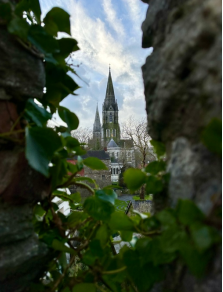
Elizabeth Fort, Saint Fin Barre’s Cathedral, Cork.
©Niklas Groß
Cork is a relatively small city, so you can explore most of the main sights in just a few days. Highlights within the city include Elizabeth Fort, Saint Fin Barre’s Cathedral, the University College Cork (UCC) campus, and the historic Cork City Gaol. A highly recommended walk leads from the city centre to Blackrock Castle, along a newly developed riverside promenade. On the way there or back, it’s definitely worth stopping by the Marina Market, a large indoor street food hall offering international cuisine and a lively atmosphere.
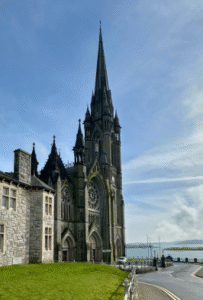
St Colman’s Cathedral, Cobh.
©Niklas Groß
Cork also boasts a vibrant and active pub scene, with events such as pub quizzes, live music – from traditional Irish tunes to international classics – beer pong tournaments, and more. Especially on weekends, there’s always something happening.
When the weather is good, relaxing outdoors is easy. In addition to Fitzgerald Park, Cork Lough and St. Patrick’s Hill are great spots to lie on the grass and enjoy the sunshine.
For short trips just outside of Cork, the harbour towns of Kinsale (about 1 hour by bus) and Cobh (25 minutes by train) are highly recommended. Both offer beautiful coastal views and a pleasant atmosphere for day trips.

The stunning Cliffs of Moher on Ireland’s west coast.
©Niklas Groß
There’s also a WhatsApp group and Instagram page (corkinternationalstudents) specifically for international students. These platforms help organize a variety of events in the city, such as parties, pub crawls, karaoke nights, and more. They also arrange affordable tours to Irish landmarks like the Cliffs of Moher, cities such as Dublin or Galway, and scenic hikes to places like the Ring of Kerry or Coumshingaun Lough. The people involved are very welcoming, and it’s a great way to make new friends – including students from UCC.
Another cultural highlight is attending a match at the GAA stadium to cheer for Cork in traditional Irish sports like Hurling and Gaelic Football. When Cork reached the provincial finals and even the All-Ireland semi-final and final in Hurling, the whole city came alive with celebration and watch parties.
If you’re a fan of other sports, you can also catch international football matches at pubs like The Woolshed, which even streams the German Bundesliga – perfect if you want to see Borussia Dortmund win a match!
5. Conclusion
I truly enjoyed my time in Ireland. I had the chance to meet many friendly and inspiring people and gained valuable professional experience. Following my internship, I’ll be moving back to Cork to work full-time for the same company. This internship was an incredibly rewarding experience both personally and professionally.
My Internship at Axelera AI in Leuven
- Electrical Engineering, Information Technology and Computer Engineering M.Sc.
- Belgium, Leuven
- Axelera AI N.V.
- 11/2024 – 04/2025
1 Application
I discovered the internship posting on LinkedIn and applied via the official Axelera careers page in late July 2024. A few days later, I had a first screening call with the hiring manager who would be supervising my internship. Next there were two longer technical interviews to assess my abilities in software and hardware development. Finally, an executive interview with the team manager and an HR interview about cultural fit and compensation, respectively, concluded the process by late August. As soon as I had received the signed work contract, I applied for Erasmus internship support from RWTH, which required some more forms and signatures.
2 Accommodation
Leuven is a student town, owing to the presence of KU Leuven. This is Belgium’s largest university by number of enrolled students. For this reason, both studios and shared flats are widespread throughout the city, but nevertheless highly sought after.
A surprising number of accommodations is advertised and rented through Facebook, which was also how I eventually found the place I stayed at. It was a room in a shared house, within walking distance of the train station and my workplace. Like most rental contracts, mine had a fixed duration of one year, with a fee for early termination that I had to pay since I left earlier. The room also came furnished, so I could move to Leuven comfortably by train from Aachen, bringing just clothing, my bike and other personal items.
3 Costs
The rent was €520 with all amenities included, which was a fairly average market rate based on my impression. Overall, housing seemed to be slightly more expensive than in Aachen, especially for studio apartments where rent could reach €1000+.
In general, most items and services seemed to cost approximately 20% more than one might be used to from Germany. This becomes apparent at restaurants, but also for groceries and other everyday purchases.
One notable exception to the higher prices is train travel. A youth ticket for any route inside Belgium with any SNCB train costs about €8 regardless of time or distance, and can become even cheaper if bought in bulk or when traveling during the weekend. Furthermore, Belgian trains are very rarely delayed.
4 Work
The project I would complete during my internship was already outlined in the job description. Its main goal was to develop a compressor block in hardware that would reduce the amount of intermediate data to be transferred inside the Axelera AI processing unit during inference. Ultimately, this would enable higher energy efficiency and performance at the cost of slightly increased chip area and complexity.
My project was structured in the phases of algorithm research in the scientific literature, prototyping of promising algorithms in Python, and finally implementation of one or more algorithms in Verilog for integration within the DMA unit.
Even though Axelera generally allows remote work, the internship contract required 100% time in the office. This facilitated deeper connection and better knowledge exchange with my colleagues, and was easily doable for me with a 10-minute walking commute.
While several employees in the System Architecture team were located in Leuven, my direct manager was based in Zurich. To enable better collaboration, we strived to meet physically once per month. Sometimes, she came to Leuven, but I also traveled to Zurich on several occasions for one week at a time. All travel expenses were covered by Axelera.
5 Everyday Life
Leuven is located in Flanders, the Dutch-speaking part of Belgium. To blend in better with everyday life, I decided to learn Dutch and reached B1 level. Reading and writing is relatively easy as German native speaker, while speaking and listening may be slightly more difficult. I attended courses at CLT, a language school affiliated with KU Leuven. These courses took place twice a week in the evening, and the classroom was easily reachable on foot. On other days, I went to a nearby gym and joined the local running club.
Supermarkets close earlier in Leuven compared to Germany, which meant that I mostly had to do groceries on Saturdays. This also applied to other time-intensive activities, such as travel.
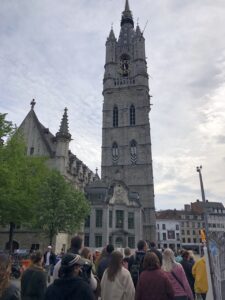
Belfry in Ghent
©Thorben Fetz
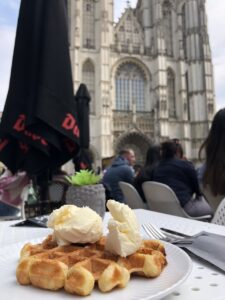
Liège Waffle
©Thorben Fetz
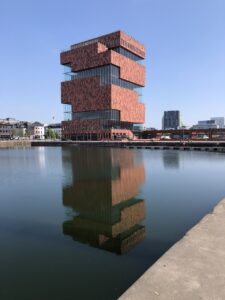
MAS in Antwerp
©Thorben Fetz
Taking advantage of the aforementioned very affordable train tickets, I visited most larger Belgian cities during weekends. Brussels is just 20 minutes away, but also Li`ege, Mechelen, Antwerp, Ghent or Bruges can be reached with direct connections. Even going to the seaside in Ostend takes less than 2 hours.

Train World
©Thorben Fetz
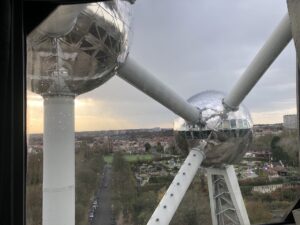
Inside the Atomium
©Thorben Fetz
Some other attractions I visited include TrainWorld in Schaerbeek and the Atomium in Brussels. Many museums offer discounted entry for students.
6 Conclusion
Overall, I am very grateful for the opportunity of conducting my internship at Axelera AI in Leuven. The experience has been invaluable, allowing me to develop both technical skills in algorithm and hardware design, as well as soft skills through international collaboration. Living in Belgium broadened my cultural horizons, while learning Dutch facilitated daily interactions.
The Erasmus funding was welcome in making this experience possible, covering relocation costs and a portion of the living expenses. This support allowed me to focus fully on my professional development and cultural immersion.
My Internship in Athens
- Engineering Geohazards M.Sc.
- Greece, Athens
- Agricultural University of Athens
- 03/2025 – 06/2025
When I first decided, that I wanted to spend some months during my studies in Greece, I was very overwhelmed with the organisation. Luckily, throughout my academic career I was able to already make some contacts to academic staff at Agricultural University in Athens. These people were very willing to host me as an intern in their department for a few months. Hence, I was lucky in finding an internship place relatively fast.
The next challenge then was to find accommodation. I did not know what I was looking for really. I only knew that I definitely did not want to live on my own but in a shared flat, to be able to make new contacts and friends quickly. Most online resources and friends of mine who had already lived in Greece longerterm, suggested to check Facebook groups to find listings of rooms in shared apartments. Whilst this was a good suggestion and I also contacted some of the listings, I kept being fearful of scams. I had heard a lot about scamming in Greece (which to this day, I have never experienced myself. Probably, this is only a bad stereotype of the Greek). This is why I then opted for renting a room through the platform ‘Housinganywhere’. I was very lucky in finding a room in a shared apartment in a very central location (Exarchia). When I moved in, I was very excited to meet my flatmates because I had no idea who I would be living with for the next three months. However, I was very lucky to be sharing the apartment with a 25 year old German and a 23 year old Romanian. We quickly became friends and explored our new home together.
I had previously been to Greece either for vacation or for work trips several times and always perceived the living expenses to be incredibly low. However, I must withdraw this statement. Now, that I have spent so much time in Athens, I must say that living expenses are nearly equal to those in Germany (Aachen). Whilst some produce like fresh fruit and vegetables or public transport were shockingly cheap, other expenses like rent, groceries, toiletries etc. were just as expensive as they are in Germany. Obviously, Athens as a large town and the capital of Greece, is rather expensive in comparison to other Greek cities. However, this left me wondering, how the typical Greek person can manage to live in Athens with the normal Greek salary.
My everyday-life in Athens was mostly dominated by the 40 hours per week that I spent inside the university working. Whilst I got to know many other Erasmus students and other Internationals, I was mostly surrounded by Greek people at work. I felt this to be a very enriching experience since I was able to learn a lot about the Greek mentality, lifestyle and mindset only through my working hours. Outside my work, I spent most of my time with other international student and/or my flatmates. Together, we tried to navigate life in Athens without getting lost in this busy city. In our free time, we naturally spent most of our time outside, in parks or on the beach. Living so close to the sea and being able to spontaneously decide to go swim in the ocean felt like a huge privilege to me.
Additionally, I tried to explore as much of Greece outside of Athens as I could. Through a thousand different options of transportation – busses, trains, trams, metros, rental cars, … – I was able to explore many remote areas as well as urban areas within Greece. These included Kalamata, Gerolimenas, Methoni, Glyfada, Korinth, Koroni and many more. In addition to that, I also really fell in love with the ancient history of Greece and spent time visiting archaeological sites like the Akrokorinth or the Delphi oracle and also the monasteries of Meteora.
If I could, I would advise everyone who thinks about spending time abroad, to consider choosing Greece. Whilst the language might seem difficult and the life in Greece seems to be busy and chaotic, it is also an incredibly beautiful country full of lovely people, delicious food, rich history, beautiful landscapes – and of course many cute cats. I have felt very welcome wherever I went in Greece, with numerous Greeks being able to even speak some German to me. The Greek people were always happy to include me in their culture and life, introduce me to their local food and traditions and make me feel at home.
Writing my Master’s Thesis in Kraków
- Physics M.Sc.
- Poland, Kraków
- Uniwersytet Jagielloński
- 09/2024 – 06/2025
1. Application/Finding an internship
I became aware of the Erasmus+ internship because I wanted to return to the research group where I had already written my Bachelor’s thesis for my Master’s thesis. Unfortunately, it was not possible to write my Master’s thesis there. The group leader therefore suggested that I ask one of the cooperation groups in Lübeck or Krakow whether they could offer me an internship to write my thesis there. So that’s what I did.
I chose Krakow because I had already studied in Aachen for a few years and wanted to get to know another country. I had also wanted to learn a Slavic language for a long time, so Poland was an obvious choice.
The application process was quite straightforward overall, as I already had contacts in Krakow. The whole thing was quick and easy to organize, especially as the local group was happy to provide support. It was therefore not necessary for my university to help me find an internship; I was supported by my former research group.

©Phillippe Clement
2. Accomodation & Living expenses
During my stay in Krakow, I lived in an apartment that I looked for myself. However, it wasn’t easy to find an apartment, as most of the platforms are in Polish. If you only speak English, the choice is much more limited. So I was all the luckier: I found a well-located apartment that was in good condition. My landlord had also grown up in the USA and spoke fluent English, which made things a lot easier.
It is generally more difficult to find a suitable apartment in English. Many offers that are suitable for international students are either very outdated (e.g. apartments with a coal stove in the living room) or simply overpriced.
The cost of living in Krakow is generally lower than in Aachen. As far as food is concerned, I would say that the prices are roughly comparable to Germany. However, eating out is much cheaper and leisure activities are also usually affordable. Public transportation is well developed. However, there is no equivalent to the Deutschland-Ticket for students – instead you get a 51% discount on tickets.
3. Everyday life/ the internship
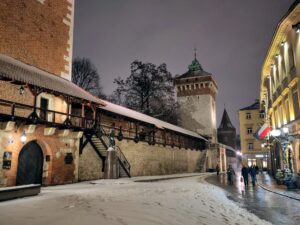
©Phillippe Clement
During the week, I went to university to work on my Master’s thesis. I also took some courses at the Jagiellonian University, which were not directly part of the Erasmus program, but were of great interest to me. The atmosphere at the university was very pleasant, open and collegial. There were only occasional minor problems in the administrative area, as not all staff speak fluent English. In such cases, I had to rely on the support of my supervisor, who helped me a lot.
In terms of content, I worked with neural networks as part of my Master’s thesis. Roughly speaking, the aim of the research group is to develop a detector that can be used in the field of proton therapy, a precise form of radiotherapy for cancer, in order to improve the accuracy of the treatment. In the process, I gained a lot of new knowledge, especially in the areas of machine learning, data structures and the application of ROOT, a widely used data analysis framework in physics.
The collaboration with my colleagues on site was relaxed and pleasant, which made the work much easier. The main language of communication in the lab and in the office was English, as Polish is quite a demanding language and I couldn’t speak much myself yet. Nevertheless, I took the opportunity to learn a little Polish to help me settle into everyday life.
4. Free time/tips
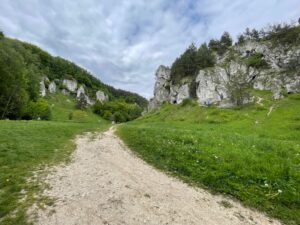
©Phillippe Clement
In my free time in Krakow, I had an incredible number of opportunities to be active and enjoy nature. Right next to the campus is a disused quarry with crystal-clear water, a popular place for swimming and relaxing. You can also climb the surrounding rock faces nearby. In general, the region around Krakow offers many opportunities for climbing, as the so-called “Polish Jura” stretches between Krakow and Częstochowa, a limestone mountain range with an impressive landscape.
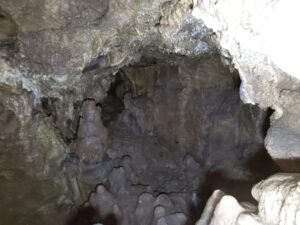
©Phillippe Clement
In addition to climbing, I also went on several hikes. I found it particularly exciting that there are officially designated places in Poland where you can camp in the countryside. This means you can go on longer hikes at the weekend and spend the night in the forest along the way. There are also a number of caves in the area to explore.
In terms of social life, I was very lucky to meet many international people, some of whom were Erasmus students, but also others who live or study in Krakow independently of the exchange program. As a result, I have built up a broad international network. The students at the university are mostly of Polish origin, but among the doctoral students there are many from South Asia, and I met some very nice people from India and Iran.
5. Conclusion
I take an incredible amount from my time in Krakow, both professionally and personally. On the one hand, I was able to work on exactly the research project I was interested in and gain valuable experience in the field of machine learning and detector physics. On the other hand, I started learning Polish and immersed myself in the culture.
I have not regretted the decision to go to Poland for a second, on the contrary: I am happier here than in any other place I have lived before. So much so that I have decided to stay in Krakow for a while after I graduate.
I can recommend an Erasmus+ internship without reservation, not only to learn something new professionally, but also to step out of your comfort zone, gain new perspectives and make international contacts. You learn a lot in a very short time when you suddenly move to another country with a different language where you hardly know anyone. Especially with regard to your own career, such a stay abroad can be enormously valuable, and this experience definitely looks good on your CV.
Writing my Master’s Thesis at the UCL
- Environmental Engineering M.Sc.
- United Kingdom, London
- University College London
- 09/2024 – 03/2025
Application
In January 2024, I applied to AVT (Aachener Verfahrenstechnik) at RWTH for an external master’s thesis at University College London (UCL). The AVT offers not only Erasmus places for process engineering students, but also external master’s theses at partner universities. I was particularly interested in topics related to fuel cells and water electrolysis, and looking through the partner universities I found out that I could combine research in this field with living in one of my favourite cities in Europe! After my successful application to AVT, I was put in contact with the exchange student coordinator at UCL’s Department of Chemical Engineering to find a topic and a supervisor. From UCL side, I had to apply as an undergraduate exchange student to be part of the official exchange student programme, even though I wouldn’t be taking any courses but would be working full-time in the labs. For this application I had to take an IELTS language test and submit a letter of recommendation, which was provided by the Erasmus team at AVT. After an online interview with one of the Associate Professors of the Electrochemical Innovation Lab (EIL), I decided on a preliminary topic for the thesis. Once these steps were completed, I was able to apply for my Erasmus+ internship grant and my UK visa.
Accomodation & Cost of Living

The view from my room in Camden ©Bia Brandt
As much as I love London, finding affordable accommodation can be challenging. UCL offers accommodation in the university’s halls to first year and exchange students. Accommodation in the halls is much more expensive than renting a room in Aachen, but still a good price for London. As I had already lived in London for an exchange semester during my undergraduate degree, I was not eligible for halls accommodation and spent my first two weeks in London looking for private accommodation. Especially in September a lot of people are on the lookout for a room as the university year is just starting. For my search I used Facebook groups and a website called Spareroom. Often rooms can only be rented on a yearly basis and for council tax reasons it is easiest for students to find accommodation in shared flats with other students. As well as finding rooms to rent, you can also use Spareroom to get in touch with other people who are looking for rooms. I went to a few flat viewings with a group of UCL students I had met through Spareroom. We didn’t end up renting together, but we remained friends for the rest of my time in London. The room I rented in the end was a six-month sublet in Camden and cost £950 a month. The area was great to live in (my favourite spot is Regents Canal) and I was spared many hot, stuffy and expensive tube rides as I could take the bus to UCL ☺️
Not only the rent, but the cost of living in general is a lot higher than in Aachen. Public transport is expensive, especially the tube if you use it regularly at peak times. Food in the UCL cantine costs ~£6 per meal (I always meal prepped as most of the students did). Also, there was a Lidl close to UCL where I usually did my shopping as the food is very reasonably priced there. There is an endless amount of things to do in a city like London. While eating out or going to the pubs will cost you a small fortune there are also things that can be done for free, as for example many of the museums. I can recommend the British museum which is just down the road from UCL, making it possible to visit the Rosetta stone during a lunch break.
Master’s Thesis in the EIL Labs

London at night ©Bia Brandt
On a day-to-day basis, I arrived at UCL around 9am and started working in the EIL labs. Mostly PhD students and research fellows work in the EIL labs and from the beginning I was part of the team and shared an office with the group. Compared to my previous research experience in AVT, I worked much more independently with different PhD students helping me where my research overlapped with theirs. I had a lot of freedom in where to go with my Master’s thesis, which was a very valuable experience, but also challenging at times. The labs and the work were sometimes a little less structured than I was used to in Aachen. However, everyone there was very helpful, especially in the first few weeks and when I was collecting my equipment, which was very valuable. Even though I was there for a Master’s thesis, I was treated like a PhD student, with bi-weekly meetings with one of the academic leaders of the group. I was not the only international visiting the EIL labs, there were two PhD students on a six-month visit for the same period as my Master’s thesis. Towards the end of my stay, another Masters student joined the EIL group for a research project. Overall, I felt very welcome in the group and even though I was the only one doing a Master’s thesis, it felt very easy to connect and spend time with the others both inside and outside of the labs.
Life at UCL & in London

Weekend walks along Regents Canal ©Bia Brandt
Needless to say, living in London is amazing! Over the course of my Master’s thesis I always took the weekends oft to enjoy the city. There is so much to do and even though I have spent 6 months doing all the touristy and not so touristy stuff, I still have things on my list. One of my favourite activities in London is to just walk around the streets or drive around in the red double decker busses as there is always something interesting to see.
Something I particularly enjoyed about studying at UCL is the societies. UCL has a very vibrant student community, and everyone can be part of it. When I went to the society fair at the beginning of my stay, I learned that there is a society for every hobby imaginable (ranging from a Taylor Swift Society to the Bubble Tea Society). I decided to join the Dance Society, the Hiking Society and the Photography Society (joining is very easy, you just need to pay ~£10 at the beginning of the semester to become a member). Joining the societies meant my calendar was full of social events from week one, but of course it took a bit longer to actually get to know the people in the societies. The society I enjoyed the most in the end was the Photography Society. How often do you get the chance to meet up with models (students from the modelling society) in a park in the middle of London and do a spring photo shoot as an amateur photographer?
Conclusion
The past six months have been incredibly intense, full of visits from old friends while making new friends. I had a steep learning curve academically through working more independently than I have before but also got the chance to dive into a more creative world through the societies and meet people who study something completely different from me. All of this in the setting of a huge and chaotic, yet also very beautiful city. Even though it took a lot of time to prepare and was an expensive time abroad, I am very glad I spent these six months in London ♡
Master Thesis in Finland in Winter – Is That Something for You?
- Product Development M.Sc.
- Finland, Oulu
- Oulun Yliopisto
- 11/2024 – 05/2025
Hello,
my name is Eileen, and I’d like to tell you a bit about my time here in Finland and hopefully inspire you to come and experience Finnish nature during wintertime.
I wanted to write my Master’s thesis in Oulu because my Finnish boyfriend lives and works there. I had already visited Oulu a few times during different seasons. Typically, the snowy season lasts from around November to May, but of course, this can vary quite a bit from year to year. Winters here are much darker and colder than in Germany, but I guess that doesn’t surprise anyone. It can get extremely cold – temperatures of -20°C are quite common in Oulu, since it’s only about 200 km south of the Arctic Circle. This means that in December, the sun barely rises at all, but on clear days, you can sometimes see a beautiful pink sky in the late afternoon.
I used to think I didn’t like winter, but winter in Oulu is very different compared to North Rhine-Westphalia. There are many fun winter activities like ice skating, skiing, and of course: sauna, which make this season really enjoyable. Most Finnish schools have ice rinks in winter that are free to use – you just need your own skates. Oulu also has many cross-country skiing trails that are maintained by the city. These are free to use and usually run through the forest. One side of the trail is prepared for classic skiing, and the rest can be used for skate skiing. I believe it’s also possible to rent skis, although I haven’t tried that yet. Another good option is to check out Finland’s version of eBay, called Tori, for used equipment. If you’re into downhill skiing, there are several ski centers a few hours away from Oulu that you can reach by car. Having a car in winter can be very useful. Finnish cars usually have studded winter tires, and parking spots often have outlets to plug in car heaters that warm up the engine before you drive. It is possible to bring your own car to Finland, but you should feel confident driving in winter conditions and make sure to get proper Finnish winter tires.
There are a lot of saunas in Finland, and it’s very likely that your apartment building will have a shared sauna that you can book. If not, going to a swimming hall is a good and affordable alternative – the sauna is usually included in the entrance fee. There are also river saunas where you can try ice swimming! If you’re more into indoor activities, Oulu also has climbing gyms and a trampoline hall. And of course, winter is the season to hunt for the Northern Lights, especially from November to March. They can be stunning, but you might have to wait a few weeks for clear skies. You can use a Northern Lights app to track when and where they might appear. Do not be disappointed, they always look brighter in pictures than in real life. Oulu also has an ice hockey team called Kärpät, and going to a game is definitely worth it! There are many beautiful national parks you can visit, such as the Little Bear’s Trail, which is lovely year-round but gets crowded on summer weekends because it’s the most popular trail in Finland. A bit closer to Oulu is Syöte National Park, which is easier to reach by car, though I think buses are available too. Many national parks have free huts where you can sleep, and you can check the maps on the Luontoon website. Depending on your route, it can be helpful to have snowshoes for winter hiking, or you can use skis if you have them.
Public transportation in Oulu is available, but the city also maintains its bike lanes year-round, so if you’re comfortable biking in the snow – as many Finns are – you can do that too. You can even get winter tires for your bike for better grip.
There aren’t many big cities near Oulu, but you can take a train north to Rovaniemi to visit Santa Claus. A few hours south by train is Tampere, a large city by Finnish standards. You can also visit the Ranua Zoo, which has many animals native to Finland.
Oulu itself has only a few sights in the city center, and half a day is enough to see them all (such as the policeman statue, the market hall, the main church, the free city museum, and the harbor). In winter, you can even walk on the frozen Baltic Sea, which connects some of the islands to the mainland. At the moment many sights are under construction, because Oulu is will be the European Capital of Culture of 2026.
Culture
The Finnish people I’ve met so far have been very open and friendly. While people in Nordic countries are often said to be more reserved – which is true to some extent – joining a sports club is a great way to meet locals. I joined the fencing club in Oulu, and they’ve been super friendly and welcoming, they also welcome beginners.
In general, people here are more relaxed than in Germany, and you usually thank the staff when leaving a store, which I really like. Because of the long dark winters, alcohol consumption is more strictly regulated than in Germany and also more expensive. Beer and low-alcohol drinks can be bought in supermarkets before 9 p.m., but for stronger alcohol, you have to go to a special store.
Language
No need to speak Finnish at all – English of course is enough here in Finland!
Living Costs and Organization
I sent my CV and a cover letter to the University of Oulu to find a thesis position in the mechanical engineering department. One of the professors then set up an online interview, and that was all I needed for the application process. After that, I searched for a supervising institute at RWTH, which was very easy and didn’t take much time.
Living in Finland is more expensive than in Germany, especially if you want to eat out. However, the University of Oulu pays you for writing your thesis there. In addition, you can apply for an Erasmus Traineeship Scholarship. You should apply for Erasmus at least six weeks before your internship starts.
The University of Oulu has a website for foreign workers that explains all the organizational steps you need to take – you can use this even if you’re writing your thesis for a company. However, it might not be possible to write your thesis for a company at all, depending on whether you can find a supervising institute at RWTH.
Flying or Taking the Train?
I usually fly to Finland, because taking the train is very time-consuming, just as expensive as flying, and quite exhausting. But if you have time, it could be a nice experience: you can go by train to Copenhagen from Hamburg, then on to Stockholm, and take a ferry to Finland (from Stockholm or Uppsala). This is a great way to avoid flying and see some cities on the way. There are also night trains you can take in Denmark or Sweden.
When I fly, I usually go to Helsinki, and from there, I either take the train (possibly a night train) or a domestic flight to Oulu. From Oulu airport, you can take a bus or taxi into the city. In winter, flying to Rovaniemi or Kittilä and taking the train from there to Oulu might also be a good option. You can check train schedules on the Finnish railway website [VR].
Final Thoughts
I would definitely recommend Finland as a destination for your Master’s thesis if you enjoy winter sports, hiking, and nature – and if you’re confident that you can make friends here, for example through sports clubs or among Erasmus students at the university. Otherwise, the long and dark winters might be difficult to enjoy.

©International Office
My experiences at Volvo Technology
- Energy Engineering M.Sc.
- Sweden, Göteborg
- Volvo Technology
- 10/2024 – 05/2025

Masthugget Church Viewpoint East ©Marc Müllenbach
Hello, my name is Marc. I am a German studying Master Energy Engineering at RWTH Aachen University, Germany, and participated in a research stay funded by the Erasmus+ Internship program during my master’s thesis at Volvo Technology – one of the most Swedish companies imaginable – in the second largest city Göteborg, Sweden. Getting this opportunity, to work on practical research in a company, was very difficult and almost did not work out. I started applying more than a year ahead, but this was way too early for most cases. In Sweden, there are no mandatory internships of up to 6 months; Swedish students gain practical experience during their summer break. Yes, you heard right: all students have a 2-3 month study-free period during the summer, without the need to prepare for exams, since they finish them before Midsommar (the summer solstice). Their internship culture comes from the fact that students do not receive their student funding during vacation, so many rely on summer jobs to survive financially until the next study period. Because internships are limited to these three months, companies don’t know about longer internships, especially not outside this period, as is common in Germany. Another aspect is that thesis work usually starts in January, as Swedish studies are separated into four periods, and are mainly carried out in groups of two—eliminating most chances if you want to start according to the German semester dates and alone. However, you would not be reading this if I hadn’t made it despite the low chances. I applied a lot, sent unsolicited applications to companies, connected with people on LinkedIn, and sent dozens of requests for an internship with the opportunity to follow up with a master’s thesis, which is usually the catch in Germany. The position was acquired via an unsolicited application to an industrial PhD student in cooperation between Chalmers University of Technology and Volvo Group, which led to the position at Volvo Technology. Other research internships would have been possible at Chalmers, but the research topic and work environment at Volvo were the best option.
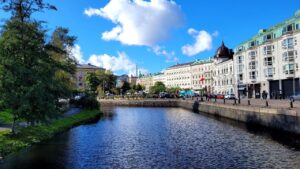
Moat of the old city fortifications, Bazarbron ©Marc Müllenbach
Finding a suitable accommodation without being registered as a Swedish student brings further problems, since you are not eligible for student accommodations. Some shared living opportunities always exist but are highly requested and not available in sufficient quantity. Some international students even live in hotels or cabins for the first year. In Swedish metropolitan areas, housing agencies require you to be in the queue for several years. Even colleagues at my workplace, who were in the queue for up to three years, were not able to find suitable accommodation (for their living standard) and ended up buying instead. I found mine with a lot of luck on Facebook (which is widely used in Scandinavia and also serves as an online marketplace and for international exchange). The accommodation had two rooms, one bedroom, and one living room/kitchen. The monthly costs were approximately €450 per person, with all additional costs included. I lived there with my girlfriend, who also studied at Göteborg University. For grocery shopping, I highly recommend using “Too Good To Go,” which offers a full bag of vegetables close to expiration for under €5—this saves money since vegetables and fruits are noticeably more expensive compared to Germany. Monthly expenses for groceries were roughly €200 per person, including all food and household costs and eating out every two weeks. Since the canteen at Chalmers was €6 (student) or €8 (visitor), and at Volvo Group €10, I decided to always prepare my own food, which is popular in Sweden. There are always spaces with microwaves and cutlery. For transportation, you can use rental bikes for €30 per year (Nextbike/Sty&Ställ). Since I needed to get to the other side of the harbor to Göteborg Lundby, I bought a tram ticket, which was €60 (student) or €75 (non-student) per month. Even though I was a student, I couldn’t use the student discount for many occasions, since in Sweden your student status is verified by a “Mecenat” app account issued by a Swedish university, which I did not have.
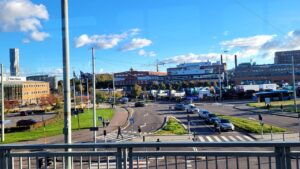
Volvo Group, Gropegårdsgatan 10 ©Marc Müllenbach
Everyday life during the research stay was a 40-hour workweek, starting at 9:00 and ending at 17:00. It is common to have a one-hour lunch break at 11:00, which I always spent with coworkers. Since I started in October, I was the only student at the company until January, when two other thesis workers joined, as is usual during this time. From Volvo, I received a laptop for my research work, which was mainly self-guided and supervised by weekly meetings with my supervisor. I highly enjoyed short coffee breaks with colleagues around 14:00-15:00, called “fika,” to discuss technical topics or daily life. There was one 30-minute fixed slot per week where the whole department met, and one colleague always brought sweet pastries or cake. The department worked great as a team, and I think this weekly contact, as well as spontaneous meetings on other days, helps with teambuilding. I also enjoyed that Volvo Group is an international environment, and you can get into contact with everyone on a casual basis since in Sweden you always call people by their first name; titles and positions do not mainly define your personality.

Vrångö Island ©Marc Müllenbach
During the winter, I came home from work when it was already dark, but there are many options available. Monthly sports membership at “Fysiken” cost €33 per month (3-month period) for students, including gym, courses, team play, and climbing/bouldering. I used to go every second day and made friends during climbing and basketball. It seems much easier to make international friends, as Swedish students usually already have their friend groups. Getting into those groups takes time and is comparable to making friends in Germany. With friends found that way, at the company or through international university programs such as ESN, you will definitely find people to spend time with—though more likely internationals who will leave after six months. However, Göteborg is a city where you can spend your time at many places, such as bars with after-work discounts and pub quizzes, museums, or at the ice hockey arena watching “Frölunda HC.” Around February, you will get home when it is still bright outside and can spend the sunset at famous places such as “Skansen Kronan.” On weekends, I recommend visiting the local historical
amusement park “Liseberg,” the islands in the archipelago near Gothenburg, one of the beaches, or hiking around lakes such as “Delsjön.” Trips around Sweden to Stockholm, Malmö, Helsingborg, or even Oslo in Norway are easy to do on a small budget. ESN also offered a one-week trip to Swedish Lapland, which everyone recommended to me, but I was quite
occupied by research work and also took vacation to visit my family over Christmas.
In conclusion, I liked Swedish culture before, and this trip increased its attraction. Sometimes it was tough to receive the same rights as locals, since you always need digital proof such as Swedish student status (“Mecenat”). For foreigners, it is also impossible to buy at a local food market or farm since “Swish,” the Swedish version of PayPal for payment, requires a Coordination Number for a Swedish ID, a Swedish bank account, and BankID. There are also several special days with traditions such as St. Lucia around Christmas, Valborg/Walpurgis Night and Swedish National Day in spring, and Midsommar in summer. However, my girlfriend and I decided to continue our time in Sweden and enjoy one or more summers at the coast and in nature, where Sweden has much to offer.
Writing my Master Thesis in Trondheim
- Chemistry M. Sc.
- Norway, Trondheim
- Norges Teknisk-Naturvitenskapelige Universitet
- 07/2024 – 01/2025

Figure 1: Cross-country skiing on Finsevatnet in Finse, mid-January. ©Julia Wang
Preparations
People often ask for the reason I chose Norway: Initially, I planned to do an internship in Sweden and then return to Germany for my thesis. Unfortunately, I lost contact to my Swedish prof, and as time was running out, I finished all required internships in Germany. However, I struggled to find a suitable thesis topic, so I decided to write it externally, including universities from countries in Ireland and Scandinavia in my search. I wanted to improve my English skills and also experience a place full of nature I have never been to before. As the nature in Ireland, Sweden, Norway, and Finland is beautiful, I ultimately found that Norway was the best fit for me. It offered a fascinating language but still with the comfort to speak English anytime, stunning landscapes, beautiful nature, a vibrant student city, and an exciting thesis topic.
I came across the topic of my thesis by proactively reaching out to professors working in areas I found particularly intriguing. As a chemistry student, I was often dissatisfied with the specializations at my university, so learning that Norway has a strong focus on environmental chemistry caught my attention. After a response from a professor, we had a brief meeting where he introduced me to a project based within the Arctic Circle, combining environmental chemistry with fundamental research. The process of signing the OLA was incredibly slow, but once that was finalized, there was nothing standing between me and my successful thesis – well, except for one thing: accommodation.

Figure 2: Stunning sunset in Finse, mid-January. ©Julia Wang
Accommodation & Living expenses
Overall, Norway is more expensive in nearly everything, which makes sense given their higher income. Usually, it is possible for exchange students to apply for student dorms (e.g. at Moholt). Those are particularly nice because of the large student communities that make it easy to meet new people. However, since I arrived in the winter semester – when most new local and exchange students come – the dorms were fully booked. As an internship student from Europe, I wasn’t automatically eligible for housing, so I had to request dorm accommodation. Even then, priority is typically given to international students from outside Europe and those attending summer courses at NTNU.
Thus, I ended up looking through the private housing market. Luckily, I found a room in a Norwegian student’s flatshare that was subletting for the exact duration of my stay. The flatshare with 4 people was comparably affordable and with 5300 NOK (everything included) even cheaper than the dorms. My place was located near Solsiden, which wasn’t exactly close to the university, but the area was well-connected by buses. It was also closer to the city center, as Tyholt and Moholt were about a 25-minute bus ride away. Personally, I preferred cycling since it is faster, cheaper, and the terrain was less steep compared to Gløshaugen-Moholt, which was a nice bonus.
As for the general living expenses, being a vegetarian made it a bit challenging to find affordable fresh vegetables, as everything tends to be more expensive and often heavily packaged in plastic. However, you get used to the prices after a while. As someone who loves tofu, I found it difficult to find good, firm Asian-style tofu. Common supermarket chains include Rema1000, Bunnpris, and Coop Mega for cheaper options, while Kiwi and Meny are more expensive. There are also online discounts and QR codes that offer discounts on specific products, and it’s helpful to ask around in ESN groups, as they often share these codes. I also found myself visiting Asian markets, like NM Market for the best deals on rice, soy sauce, and paneer at Melon Midtbyen. In general, products with higher fat, sugar, or imported goods were about twice as expensive as in Germany. However, Norwegians tend to offer larger packaging, which can help reduce the price per unit.
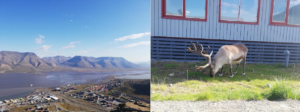
Figure 3: Parts of Longyearbyen and the Adventfjorden from the Varden viewpoint (left) and Svalbard reindeer in the middle of town (right). ©Julia Wang
Everyday life/the internship
Since I was doing my master thesis, my workload was higher compared to an average exchange student. I did miss out a bit on some activities since I was less flexible and had less free time. However, Norwegian work culture is much more chill and laid back than back in Germany. Nobody will ask you to come early and nobody cares if you leave early. Therefore, you need even more discipline to stay on track. Typical work hours in Norway are from 8am to 4pm. Afterwards, people head home for dinner. Many shops also close around 4 or 5 pm, so it’s a good idea to check their hours in advance to plan accordingly.
My thesis involved a field trip to Svalbard in mid-August, where I collected samples, spent time in the lab back In Trondheim, and then focused on writing the thesis. The working groups at NTNU are pretty small, so it is easy to get an overview but I rarely met everyone at once. Knowing how close people work together in working groups in Germany, sometimes I felt a bit lonely and disconnected from PhD or master students. However, I also enjoyed the independence I had to plan my own research, discuss it with my professor (who, by the way, dedicated a lot more time to me than the average professor in Germany would for a master’s student), and work closely with my supervisor. I also enjoyed the flexibility in how I structured my daily work and writing process.
In the evenings, I usually took part in various free-time activities including choir, anime screenings, board games, swimming, 3D printing, sewing, knitting, or baking. On weekends, I usually met up with friends, did my chores, or went on hikes and trips around the area. Sometimes, and further. With a bit of planning, you can easily bring your work with you, as many trains offer Wi-Fi! That way, you can explore places like Åndalsnes, Bergen, Finse (!!!), and more.
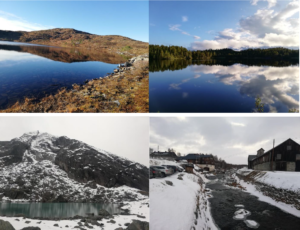
Figure 4: Stunning lakes and rivers found during hikes across Norway. Grytvatnet is found close to Vinjeøra, (upper left), Stordamvatnet is close to Lundamo (upper right), Hurrungsvatnet is near Åndalsnes (bottom left), and the Glomma river runs through Rørøs (bottom right). ©Julia Wang
Free time/tips
Trondheim is a big student city, so you will find all kinds of people. While connecting with international students was quite easy, since everyone is desperate to find friends, I was more interested stepping outside the Erasmus bubble and meeting Norwegians. And the stereotype holds true: While Norwegians are friendly and somehow open to start a conversation, there can still be a sense of distance. Personally, I’ve never been the most social or chatty person, so I always struggled to form deeper connections with anyone. That said, living with Norwegians and joining Norwegian clubs really helped me engage more with locals.
Norway is known for its stunning and beautiful nature (northern lights, midnight sun, mountains, fjords, lush green forests wherever you go!) and almost all Norwegians are big sports enthusiasts. NTNU has a student organization called NTNUI, where you can sign up for various sports clubs. Its very close to what American sports teams are like. People are competitive and passionate about their activities. If you want to try something typical Norwegian: You can join a group that teaches halling, a traditional Norwegian dance, or even take up sword fighting through another separate group.

Figure 5: Because scenary with water is so beautiful: The stunning Nyastølfossen is found close to Kinsarvik on a 3-4 waterfall hike (left) and the beautiful sunset over Vinjefjorden can be observed in Vinjeøra (right). ©Julia Wang
If you are not into sports, there are still many student groups you can join: As for me, I joined a group called PVV for board games and anime. In general, they have a different focus but they also offer great social activities. I also joined a choir (NTNU motettkor), conducted by one of Norway’s most famous conductors and a group of Norwegian music students. The group was a fun mix of exchange students and locals, and the conductor was incredibly motivating, making it a truly enjoyable experience. Another popular hobby in Norway is knitting, with knitting events often hosted at cafés or yarn shops. It’s a relaxing activity, especially on those cold, rainy days. I also had the chance to learn 3D printing and practice sewing at the MakeNTNU workshop, where you can book time on a machine to create whatever you like (They are getting new printers, finally!!).
Another great place that offers cool events is the student building down the road from the technical university building: Studentersamfundet. It is definitely worth a visit, as they offer concerts, talk shows, discussions, I addition to having restaurants and more.
As for Trondheim, nature is incredibly accessible. You can enjoy small walks along the coast to the fjord in Lademoen, hikes in Estenstadmarka to the southeast, or head to Bymarka to the west. In winter, Bymarka is perfect for cross-country skiing. For bigger adventures, the ESN group organizes trips to Lofoten, Lapland, and other places. Otherwise, it is advisable to form small groups and rent a car to get around, especially in winter. While many people opt for Airbnbs, I highly recommend trying the great network of cabins in Norway! NTNUI Koiene have basic cabins around Trøndelag but personally, I suggest going for the DNT cabins as they are more spacious and comfortable.
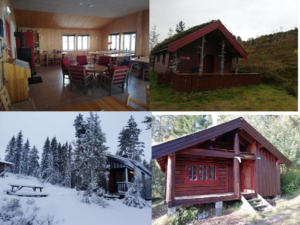
Figure 6: The common room in the DNT Brebua cabin in Finse (upper left), the DNT Venjedalsbu cabin close to Åndalsnes (upper right), a private cabin at Bymarka close to Ringvål (bottom left), and the Flåkoia NTNUI cabin near Lundamo (bottom right). ©Julia Wang
Conclusion
If you are an outdoor enthusiast who enjoys nature and want to experience a new culture during your internship or your thesis with excellent supervision and a nice work environment, I definitely recommend Norway. Not only did I gain insight into the country and its people, but I also embraced a new way of living my life while staying productive. There are plenty of opportunities and activities that allow you to connect with others. You just have to step out of your comfort zone and start engaging people!
I hope you enjoy your time here as much as I did if you choose Norway.
P.S. Yes, it does get pretty dark and depressing from November to February (Average daylight around 5h in Trondheim). But trust me, the experience alone is worth it. Plus, the midnight sun and longer days in summer make up for it!

